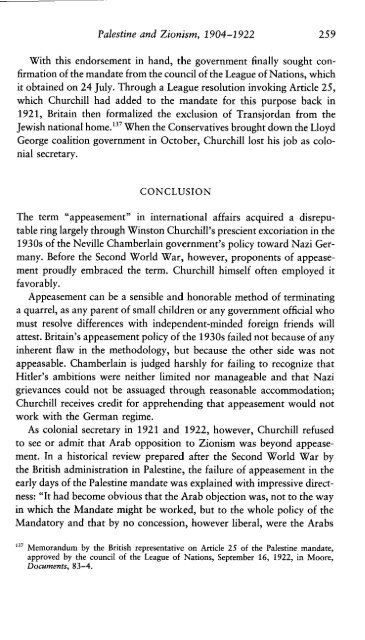Churchill, Palestine and Zionism, 1904-1922 - Douglas J. Feith
Churchill, Palestine and Zionism, 1904-1922 - Douglas J. Feith
Churchill, Palestine and Zionism, 1904-1922 - Douglas J. Feith
You also want an ePaper? Increase the reach of your titles
YUMPU automatically turns print PDFs into web optimized ePapers that Google loves.
<strong>Palestine</strong> <strong>and</strong> <strong>Zionism</strong>, <strong>1904</strong>-<strong>1922</strong> 259<br />
With this endorsement in h<strong>and</strong>, the government finally sought confirmation<br />
of the m<strong>and</strong>ate from the council of the League of Nations, which<br />
it obtained on 24 July. Through a League resolution invoking Article 25,<br />
which <strong>Churchill</strong> had added to the m<strong>and</strong>ate for this purpose back in<br />
1921, Britain then formalized the exclusion of Transjordan from the<br />
Jewish national home.137 When the Conservatives brought down the Lloyd<br />
George coalition government in October, <strong>Churchill</strong> lost his job as colonial<br />
secretary.<br />
CONCLUSION<br />
The term "appeasement" in international affairs acquired a disreputable<br />
ring largely through Winston <strong>Churchill</strong>'s prescient excoriation in the<br />
1930s of the Neville Chamberlain government's policy toward Nazi Germany.<br />
Before the Second World War, however, proponents of appeasement<br />
proudly embraced the term. <strong>Churchill</strong> himself often employed it<br />
favorably.<br />
Appeasement can be a sensible <strong>and</strong> honorable method of terminating<br />
a quarrel, as any parent of small children or any government official who<br />
must resolve differences with independent-minded foreign friends will<br />
attest. Britain's appeasement policy of the 1930s failed not because of any<br />
inherent flaw in the methodology, but because the other side was not<br />
appeasable. Chamberlain is judged harshly for failing to recognize that<br />
Hitler's ambitions were neither limited nor manageable <strong>and</strong> that Nazi<br />
grievances could not be assuaged through reasonable accommodation;<br />
<strong>Churchill</strong> receives credit for apprehending that appeasement would not<br />
work with the German regime.<br />
As colonial secretary in 1921 <strong>and</strong> <strong>1922</strong>, however, <strong>Churchill</strong> refused<br />
to see or admit that Arab opposition to <strong>Zionism</strong> was beyond appeasement.<br />
In a historical review prepared after the Second World War by<br />
the British administration in <strong>Palestine</strong>, the failure of appeasement in the<br />
early days of the <strong>Palestine</strong> m<strong>and</strong>ate was explained with impressive directness:<br />
"It had become obvious that the Arab objection was, not to the way<br />
in which the M<strong>and</strong>ate might be worked, but to the whole policy of the<br />
M<strong>and</strong>atory <strong>and</strong> that by no concession, however liberal, were the Arabs<br />
137 Memor<strong>and</strong>um by the British representative on Article 25 of the <strong>Palestine</strong> m<strong>and</strong>ate,<br />
approved by the council of the League of Nations, September 16, <strong>1922</strong>, in Moore,<br />
Documents, 83-4.


